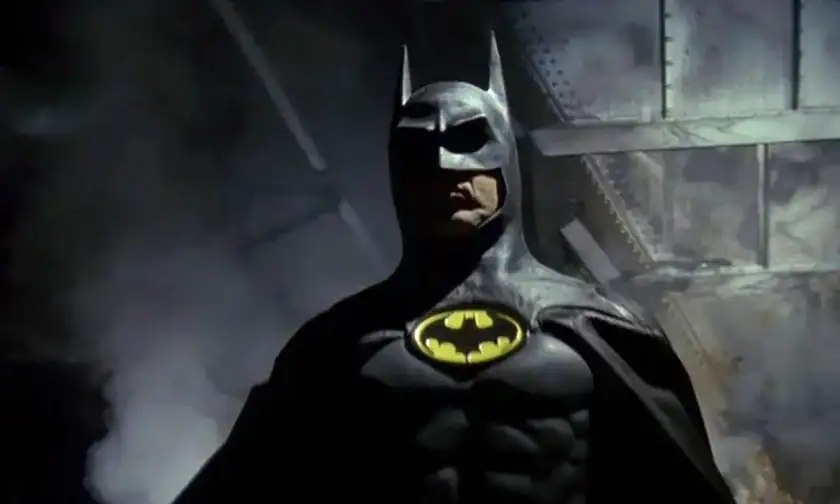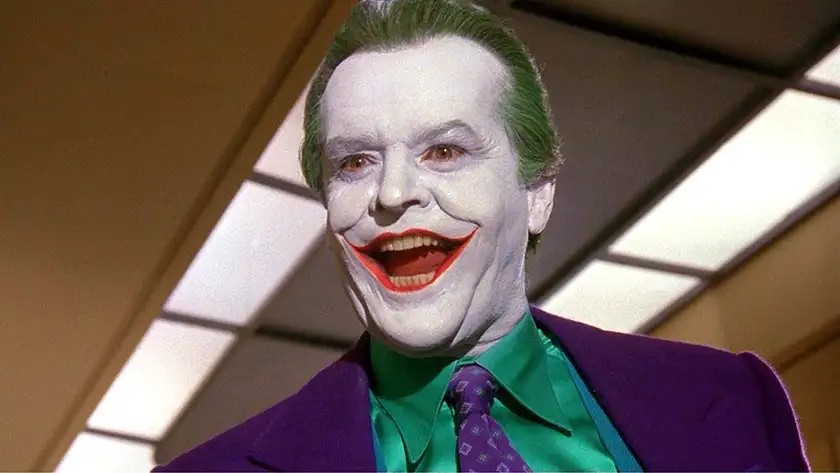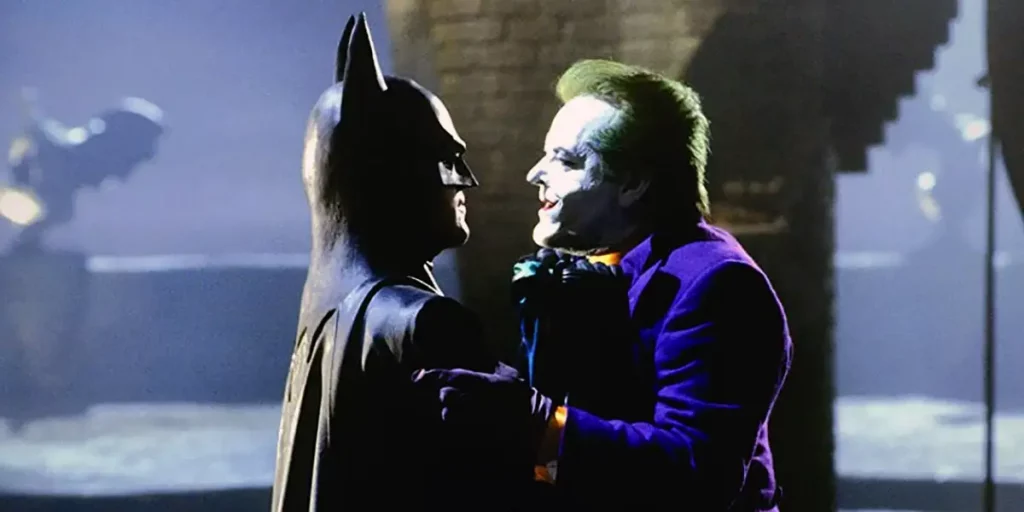Tim Burton’s Batman (1989) remains a monumental landmark for comic book films, led by the fantastic performances of Michael Keaton and Jack Nicholson.
Director: Tim Burton
Genre: Action, Adventure, Superhero
Run Time: 126′
US Release: June 23, 1989
UK Release: August 11, 1989
Where to watch: on digital & VOD
Imagine a film being so good and so successful that it manages to define its title character over the course of multiple generations. That is exactly what Director Tim Burton’s Batman (1989) did for the caped crusader and its impact is still being felt in the present day. As part of Loud and Clear’s Tim Burton Month, I jumped at the opportunity to review this film that kicked off the superhero genre.
Although I loved it as a teenager, would it still hold up? The answer is a resounding yes, with one tiny exception.
Batman (1989) starts as billionaire Bruce Wayne (Michael Keaton, of Beetlejuice), after witnessing the murder of his parents as a child, has recently begun his war on crime in the fictional Gotham City in the guise of Batman. He soon crosses paths with mobster Jack Napier (Jack Nicholson, of One Flew Over the Cuckoo’s Nest) and their encounter leaves Napier disfigured and driven mad. As Bruce strikes up a connection with photojournalist Vicki Vale (Kim Basinger, of The Natural), Napier, now referring to himself as The Joker, begins taking over Gotham’s criminal underworld. Bruce must face his past before heading out in the night as Batman to put a stop to Joker’s reign of terror.
This narrative serves as a near complete reinvention of its title character, especially when one compares it to the version audiences were most familiar with at the time. While Burton’s take on Batman still possesses some of the camp featured in the 1960s television series starring Adam West as Bruce Wayne/Batman, this film is without a doubt darker. The film’s story primarily adapts the “Red Hood” origin for Joker, with one noticeable twist from screenwriters Sam Hamm and Warren Skaaren. The pair also took inspiration for the tone of their script from comic arcs such as Frank Miller’s “The Dark Knight Returns”.
What we have here is a fascinating duel between two figures with intertwined fates and it presents viewers with its own interesting take on the mythology of this character. The narrative establishes a greater connection between Batman and Joker via the previously mentioned twist from Hamm and Skaaren. This not only helps flesh their individual arcs out but allows the conflict between them to hold more weight.

This story feels almost timeless, even with the inclusion of a soundtrack by Prince (which is excellent, by the way). You do not get a sense of what year or era this takes place in outside of what is needed. All you need to know is that this is Bruce Wayne’s early days of being Batman. Much like any old random first issue of a comic book, you can pick this up without any prior knowledge and get lost in what is told/shown within the film.
Burton, Hamm, and Skaaren create a unique version of Batman, one that instantly separates himself from the moment he appears on screen. His suit ditches the blue and gray of the 60s series for a striking yellow and black, which was then made into the character’s standard comic book look for several years. They also do a great job of emphasizing the struggle of Bruce Wayne balancing being himself and Batman. This depiction and the one seen in 2022’s The Batman handle this issue best and incorporate it well into Bruce’s arc throughout.
Keaton may not have the traditional Bruce Wayne look, but for my money is the definitive version of the character. He presents audiences with a Bruce that is aloof, yet suave, one that you would not believe moonlights as Batman, despite his reclusiveness. He sells the fight scenes and action just as well, in spite of a suit that clearly does not lend itself well to movement even though it looks great on screen. While everyone that has seen Batman (1989) remembers the “Let’s get nuts” scene,” the moment that Keaton fully embodied this character occurs just before that. It is when Bruce is trying to tell Vicki Vale,whom he has fallen for, that he is Batman. You can see the conflict on his face perfectly, he wants to, but his sense of duty to protect not only her, but Gotham City, is pulling him back.
Perfectly finding that balance between Bruce and Batman is what makes Keaton’s performance a memorable, effective, portrayal of this iconic role. His work also elevates the narrative into something you can take seriously, even if it involves a man fighting crime in a suit.
Keaton cannot tell this tale alone, as every superhero story needs a great villain, none more so than Batman (1989). Burton and the screenwriters have built this narrative as a duel, one that only works if the duelists effectively play their parts. Luckily, they managed to recruit Jack Nicholson, perhaps at his peak, to portray Jack Napier/The Joker. With all due respect to the Academy Award winning portrayals from Heath Ledger and Joaquin Phoenix that came after, Nicholson remains the gold standard for Joker on the silver screen.
This is the closest we have ever gotten to The Clown Prince of Crime as portrayed in the comics, even with the major change of having him kill Bruce’s parents. Here, Joker is psychotic and terrifying with a costume that is dead on. His villainous plan in the film is sadistic while also being plausible. The writers make sure to give him some darkly comedic moments/lines which at times can send a chill down your spine. As the cherry on top, Nicholson is giving it his all, including letting out a maniacal laugh to die for.

The only complaint I have with Batman is the fact that this narrative is not really about Bruce Wayne/Batman. He must share the spotlight with Joker so much to the point where you will become convinced that Burton clearly had more fun with those aspects of the script. While both get standout moments, it would have been nice to have the title character not shifted to a backseat so often.
Burton’s direction and depiction of Gotham City/Batman in general is a major highlight. He and cinematographer Roger Pratt succeed at making Gotham a character of its own. Everything in the city feels alive and each building is given a unique look without ever feeling out of place. You have bright lights, foggy air, and streets littered with people. It really makes a difference when you can set a story in a space that feels in line with reality despite clearly being fictional. I love that Burton also gave us the sickest looking Batmobile to date, however unconventional it may be at times. He made being Batman look cool, which in the aftermath of the 60s series was a major accomplishment and that still holds true today.
Batman (1989) may no longer be the gold standard on film for its title character, but this absolutely paved the way for an entire genre. Michael Keaton and Jack Nicholson give two of their finest performances with far too many individual highlights to list. Meanwhile, the story told here and direction from Tim Burton showed that these stories are capable of being not only dark, but also taken seriously by audiences.
Batman (1989) is now available to watch on digital and on demand.
Loud and Clear Reviews has an affiliate partnership with Apple, so we receive a share of the revenue from your purchase or streaming of the films when you click on the button on this page. This won’t affect how much you pay for them and helps us keep the site free for everyone.

